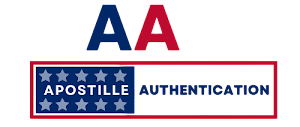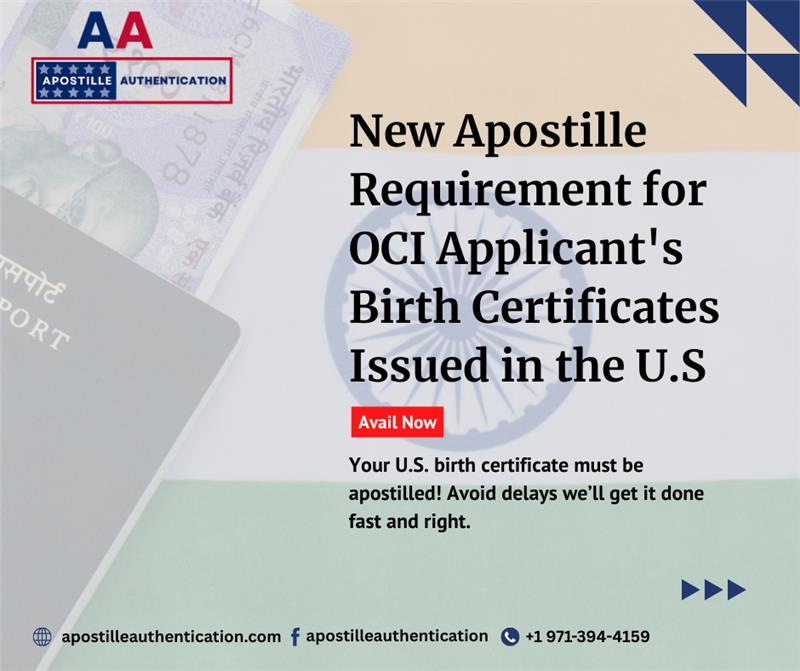Introduction
Indian-origin individuals applying for an OCI (Overseas Citizen of India) card now face updated documentation standards. A recent rule mandates that birth certificates issued in the U.S. require a notarized translation and apostille, even when issued in English. This new stipulation has created confusion and delays for many OCI applicants.
At Apostille Authentication, we specialize in assisting with apostille legalization, certified translation, and notary processing to meet updated OCI requirements.
What Is the New Requirement?
Effective immediately, the Indian Ministry of External Affairs (MEA) requires:
- A complete birth certificate issued by a U.S. authority.
- A certified English translation if the certificate is in another language (rare in U.S.).
- A notarized certificate of accuracy, attesting that the translation matches the original.
- An apostille affixed to the translator’s certificate.
- Optional: MEA may request attested translation + apostille even for English-issued U.S. certificates to verify country of issuance.
This additional apostille measure ensures the authenticity and chain of custody of the translation—thorough but essential for avoiding application rejection or delays.
Why the Change?
The Indian MEA’s new rule aims to:
- Combat fraudulent documents and translations
- Ensure consistent certificate formats
- Simplify authentication procedures at consulate offices
- Uphold document credibility for legal verification
The result: increased paperwork—but also a more streamlined clearance process once compliance is confirmed.
Step-by-Step Guide for OCI Applicants
Here’s how to get everything in order efficiently:
1. Obtain Your U.S. Birth Certificate
Request a certified copy from the issuing city, county, or state—ensure it includes the registrar’s seal and full transcription.
2. Certified (and Notarized) English Translation
Although U.S. birth certificates are in English, the MEA expects a translation “officially certified” by a translator. This includes:
- Professional translation
- Certificate of accuracy with translator’s signature and details
- Notarization by a U.S. Notary Public
Our partner translators can provide and notarize this document.
3. Attach an Apostille
The translator’s notarized certificate must be apostilled by the issuing Secretary of State (in the same state where notarized).
At Apostille Authentication, we assist with:
- Verifying state-specific apostille procedures
- Delivering documents to the correct apostille office
- Fast turnaround options to keep you on timeline
4. Include in Your OCI Application
Submit along with:
- Original birth certificate
- Translator’s certificate + apostille
- Other OCI documents as required
- Use of a complete, bilingual document packet minimizes MEA back-and-forth
5. Consulate Review & Passport
After submission, the MEA should accept the packet—no further authentication should be required. If not, contact us for next-level legalization assistance
Checklist for OCI Applicants
- Certified copy of U.S. birth certificate
- Notarized translator certificate
- Apostille attached to translator’s certificate
- All documents genuine, clean, and page-complete
- Maintained chain of custody (originals kept intact)
- Plan early—translations and apostilles take 5–7 business days
Avoiding Common Pitfalls
- Assuming “English = no translation needed” – Not acceptable under new MEA rules
- Skipping notarization – Mandatory for apostille eligibility
- Sending documents from different states – Translation and notarization/apostille must be done in the same state
- Lack of certified copy of the birth certificate – Not a passport extract or hospital copy
- Rushing last-minute – Don’t wait until OCI deadline to begin this multi-step process
Why Choose Apostille Authentication?
At Apostille Authentication, we offer:
- End-to-end guidance tailored to OCI applicants
- Certified translation services fully compliant with MEA requirements
- Notarization and apostille coordination handled seamlessly
- Quick processing with rush options available
- Clear communication—so you know exactly what paperwork hits your desk and when
For a stress-free OCI process, consider our OCI Birth Certificate Package:
- Certified translation
- Notary and apostille
- Document review and courier delivery
Find details here: OCI Translation & Apostille Services
Frequently Asked Questions
Q: Does this apply to birth certificates issued in English?
A: Yes — the MEA requires a certified, notarized translation with apostille even for English documents.
Q: How long does it take?
A: Generally 5–7 business days, expedited if needed.
Q: Can I do multiple documents in one state?
A: Yes — notarization and apostille can be bundled to save time and cost.
Q: What if the consulate rejects my submission?
A: Contact us—we can advise on next steps, including embassy/legalization if required.
Q: Is the apostille only for the translation?
A: Correct — birth certificate itself does not require an apostille, only the translator’s certificate/apostille is needed.
Final Thoughts
The new apostille requirement for U.S.-issued birth certificates in OCI applications adds extra steps—but it ensures smoother approval and prevents delays. By partnering with Apostille Authentication, you gain clarity, compliance, and confidence in completing your OCI process.
Need OCI support? Reach out today for our certified translation + apostille package designed specifically for birth certificates. Get it done right—without the headache.

